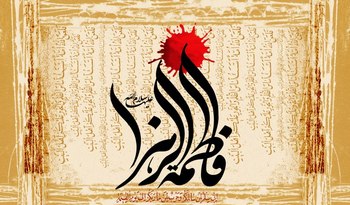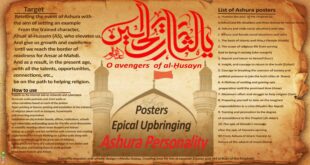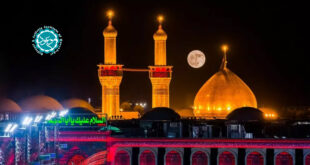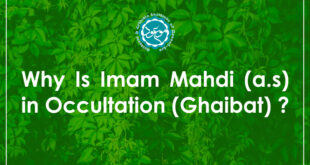The bishop feared for the Christians from perishment if the Prophet (S) would imprecate them. He said to his two fellows, ‘Do you not see Muhammad raising his hands waiting for what you shall do? By Jesus, if his mouth utters a word, we shall never go back to family or property!’
Then he said to his people, ‘Do you not see that the sun has changed, dark clouds are coming in the horizon, black and red winds have begun blowing, and smoke is coming up from these mountains? Torment has come to us. Look at the birds how they spew their craws, the trees how their leaves fall down, and the ground how it shakes under our feet!’
The bishop was certain that his people would perish and therefore, he prevented them from that mubahala. The Christian delegation asked the Prophet (S), ‘O Abul Qassim, exempt us, may Allah exempt you!’
The Prophet (S) addressed the Christians and the Muslims saying, ‘By Him in Whose hand my soul is, torment was about to afflict the people of Najran19, and if they did not give up, they would be metamorphosed into monkeys and pigs, and the valley would be burnt with fire on them, and Allah would remove Najran and its people and even birds on trees, and the new year would not come to all Christians.’20
They submitted to the conditions of the Prophet (S) and they went back to their country while their hearts were full of respect and reverence to the Prophet (S) and to his family for the high position they had near Allah.
Anyhow, this event showed the importance of the Ahlul Bayt (a.s.) and that they had no equal at all in the Muslim society which was full of sincere believers who struggled devotedly for the sake of Islam. If the Prophet (S) found ones like or better than his family, he would not prefer his family to them. Besides, he did not invite anyone from his close relatives such as his uncle al-Abbas or anyone from the Hashimites, nor did he invite any of his wives, nor his aunt Safiyya to join them with his daughter Fatimah (s.a.), nor anyone else at all.
Of course, no one of Muslim men and Muslim women was equal to the Ahlul Bayt (a.s.) whom Allah had honored and preferred to all of His creation.
In the Sunna
In the Prophetic Sunna there are many traditions the Prophet (S) had said about the virtue and the high position of Fatimah (s.a.) the principal of all women of the worlds where he mentioned her either by the name or implicitly for she is from the Ahlul Bayt (a.s.) and all the traditions about the Ahlul Bayt (a.s.) include her.
The following are some of those traditions:
1. Imam Ali (a.s.) said that the messenger of Allah (S) said to Fatimah (s.a.), ‘Allah is displeased for your displeasure and pleased for your pleasure.’21
2. Imam Ali (a.s.) narrated that the messenger of Allah (S) said to Fatimah (s.a.), ‘The Lord is displeased for your displeasure and pleased for your pleasure.’22
3. Musawwir bin Makhramah narrated that the Prophet (S) said to Fatimah (s.a.), ‘Fatimah is a part from me. Whoever displeases her displeases me.’23
4. Musawwir bin Makhramah narrated that the Prophet (S) said, ‘Fatimah is a part from me. Whatever troubles her troubles me and whatever harms her harms me.’24
5. Musawwir bin Makhramah narrated that the Prophet (S) said, ‘Fatimah is but a branch from me. Whatever delights her delights me, and whatever depresses her depresses me.’25
6. Abdullah bin az-Zubayr narrated that the Prophet (S) said, ‘Verily Fatimah is a part from me. Whatever harms her harms me, and whatever irritates her irritates me.’26
These traditions show the same meaning. It is that Fatimah (s.a.) had occupied her father’s feelings until he compared her pleasure to his pleasure and her displeasure to his. It is a great position that no woman has ever got.
7. Abu Hurayra narrated that the Prophet (S) said, ‘The first person, who shall enter Paradise, is Fatimah (peace be on her).’27
8. Imam Ali (a.s.) narrated that the Prophet (S) said, ‘On the Day of Resurrection, my daughter Fatimah will be resurrected while wearing the garment of honor that will have been kneaded with the water of life. Creatures will look at her and will be astonished. Then, she will be clothed with a garment from the garments of Paradise. On one thousand garments there will be written: “Take the daughter of Muhammad into Paradise in the best way, most perfect reverence, fullest honor and the best luck.’28
9. Once, the Prophet (S) held Fatimah’s hand and said before Muslims, ‘He, who has known Fatimah has known her, and he, who has not (let him know her); she is Fatimah bint Muhammad. She is a part from me and she is my heart and my soul that is between my two sides. Whoever harms her harms me, and whoever harms me harms Allah.’29
10. Ahmad bin Hanbal mentioned in his Musnad that the Prophet (S) had said to his daughter Fatimah (s.a.), ‘May your father be sacrificed for you!’ He repeated that three times.30
11. Imam al-Husayn (a.s.) narrated that the Prophet (S) said, ‘Fatimah is the delight of my heart, her two sons are the fruit of my soul, her husband is the light of my sight, and the imams of her progeny are the guardians of my Lord and His rope that is extended between Him and His people. Whoever keeps to it will be safe, and whoever lags behind it will perish.’31
12. He also narrated that the Prophet (S) said, ‘Fatimah is a branch from me. Whatever distresses her distresses me, and whatever pleases her pleases me.’32
13. The Prophet (S) said to Imam Ali (a.s.), ‘You will be with me in my place in the Paradise with my daughter Fatimah. You are my brother and companion.’ Then he recited this verse, “…as brethren, on raised couches, face to face.” 15:47 33
Traditions About the Pure progeny
Many traditions have been transmitted from the Prophet (S) talking about the preference and high position of the Ahlul Bayt (a.s.) and the obligation of following them. The following are some of them:
1. The Tradition of ath-Thaqalayn
It is a true tradition that has been mentioned in all books of Hadith and it is famous among all Muslims.
Zayd bin Arqam narrated that the Prophet (S) said, “I will leave for you the two weighty things that if you keep to them, you shall not go astray after me at all. One of them is greater than the other; the Book of Allah that is a cord extended from the Heaven to the earth, and my progeny. They will not separate until they will come to me at the Pond (in Paradise). So see how you will obey me in dealing with them.”34
Jabir bin Abdullah al-Ansari said, ‘I saw the messenger of Allah (S) on the day of Arafa during offering the hajj, preaching from on his she-camel and saying, “O people, I have left for you what if you follow, you shall never go astray; the Book of Allah and my progeny.”35
Zayd bin Arqam said, “The messenger of Allah (S) stayed at al-Juhfa, and then he came to people, praised Allah and said, ‘I have not found for any prophet except the half of the age of the one who was before him. And I am about to be called upon (to die). So what do you say?’
People said, ‘You have been sincere to us.’
 Mouood Mouood English Edition
Mouood Mouood English Edition




